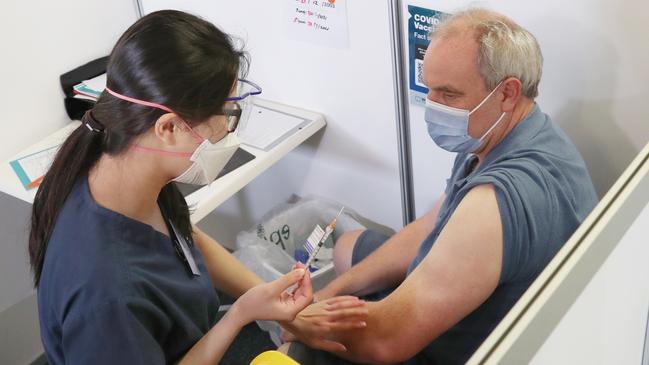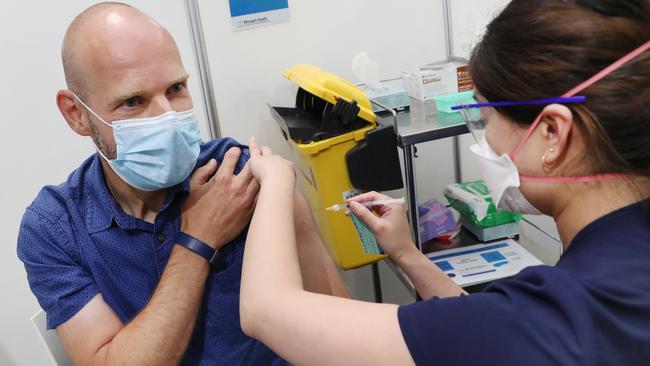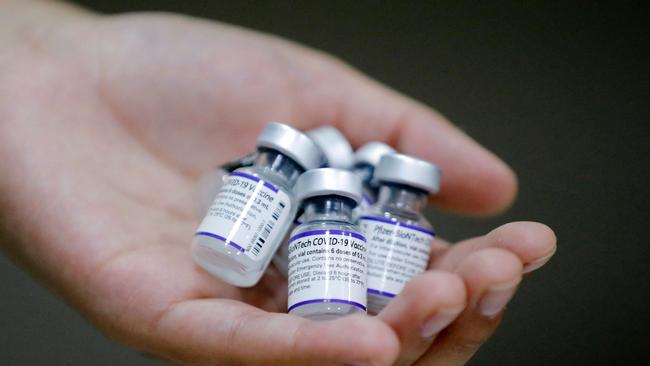What you need to know about Covid-19 boosters, side effects and when to call a doctor
We are being encouraged to get Covid-19 booster shots but there has been some nervousness in parts of the community. Here are the facts.

Coronavirus
Don't miss out on the headlines from Coronavirus. Followed categories will be added to My News.
We are being encouraged to get Covid-19 booster shots but there has been some nervousness in parts of the community. Here are the facts.
Why do I need a booster?
There is evidence that the benefits of the first two Covid-19 vaccine shots can wane over time. While protection against severe disease remains high, it does fade a little. But protection against infection and non-severe disease decreases more markedly, as does the vaccine’s ability to limit transmission from vaccinated, but infected, people. A booster improves immune responses, especially among older people who are more vulnerable to losing their protection. Boosters reduce the rate of infection, severe disease and deaths. They are a very, very good idea.
Will a booster help protect me from the Omicron variant?
The advice is yes, it will. Early mathematical modelling suggested that six months after primary mRNA immunisation, the efficacy for Omicron is estimated to have waned to around 40 per cent against symptomatic disease and 80 per cent against severe disease. A booster dose with an mRNA vaccine can raise that to 86.2 per cent and 98.2 per cent respectively. A UK study suggested the lowering of protection was more dramatic with those who had AstraZeneca initially.
Are there common side effects from the Moderna and Pfizer boosters?
It seems that the side effects are the same as for the first two vaccinations. Both have common side effects including pain at the injection site, tiredness, headache, muscle and/or joint pain, and fever and chills. Most are mild and go away within two or three days. Studies in the US suggest both types of booster have generally lower rates of adverse events than the second primary dose. The Moderna booster did have slightly higher rates of side effect. Paracetamol or ibuprofen will help if you get mild symptoms.
If I get side effects, should I call a doctor?
Not for the minor stuff. We need our doctors and ambulances available for emergencies, and a bit of soreness in the injection spot or a mild headache don’t count. But if you have a severe or unexpected reaction, shortness of breath, chest pain, swelling in your leg, persistent belly pain, severe and persistent headaches, blurred vision or other neurological symptoms, or tiny blood spots under the skin that are not at the site of the injection, don’t delay.
Should I choose Pfizer or Moderna for my booster?
It probably doesn’t matter too much. They are considered by the Australian Technical Advisory Group on Immunisation (ATAGI) to be “equally acceptable as booster vaccines for all people aged 18 years and older”. ATAGI says there are no published studies directly comparing the effectiveness of the two vaccines as a booster. Each has been approved for use as a booster around the world.

What if I had AstraZeneca for my initial two vaccine doses?
You will still need to get a Moderna of Pfizer booster. AstraZeneca is not recommended as a booster – except in rare cases where the other two can’t be administered for medical reasons (allergies etc) – and studies have shown that there is no problem with having a Moderna or Pfizer booster. For instance, a study published in The Lancet, before the emergence of Omicron, said those who had received two doses of AstraZeneca then had a booster Pfizer jab had a 25-fold increase in antibodies. The result for Moderna was seen to be similar, raising levels 32-fold.
Are the boosters recommended for pregnant women?
Absolutely! ATAGI says pregnant women aged 18 or older who received their primary course four months or more ago should have a booster dose

Will I need another booster down the line?
The jury is still out on that one. Even Pfizer’s CEO, Albert Bourla, isn’t sure as the company awaits real-world data in the face of the Omicron variant. But he suspects we may need a fourth dose.
White House chief medical adviser Dr Anthony Fauci says it is a possibility in the US. “It is conceivable that in the future we might need an additional shot, but right now, we are hoping that we will get a greater degree of durability of protection from that booster shot,” he said in late December.
An Israeli panel of experts recommended a fourth shot, but other scientists warned that too many doses might cause a kind of immune system fatigue, compromising the body’s ability to fight coronavirus. We’ll just have to wait and see how it pans out.
Can the boosters actually give me Covid-19?
No – and don’t listen to anyone who says otherwise. The vaccines do not contain any live virus. They contain the genetic code for an important part of the virus called the spike protein. The vaccine teaches the immune system to recognise the virus, allowing it to fight the invader.
How long do I have to wait to get a booster dose?
Right now, you can have a booster at least four months after your second primary vaccination. From January 31, that comes back to three months.
Do I have to pay?
Nope. Just like the initial two doses, the booster is free to everyone in Australia, regardless of Medicare or visa status.
Will my booster show in my vaccine records?
Yes, it will be on your Covid-19 vaccination certificate.
More Coverage
Originally published as What you need to know about Covid-19 boosters, side effects and when to call a doctor




